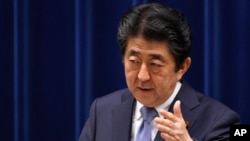Japanese Prime Minister Shinzo Abe sent a ritual offering to Tokyo's controversial Yasukuni Shrine II surrender, but did not visit in person.
Past visits by Japanese leaders to Yasukuni have outraged China and South Korea because the shrine honors 14 Japanese wartime leaders convicted as war criminals by an Allied tribunal, along with war dead.
Ruling Liberal Democratic Party lawmaker Masahiko Shibayama, who made the offering on Abe's behalf, said the prime minister asked him to pray for the souls of the departed and that Abe regretted being unable to pay his respects in person.
Abe has only visited the shrine in person once since taking office in 2012 but has previously sent offerings.
China's relations with Japan have long been haunted by what Beijing sees as Tokyo's failure to atone for its occupation of parts of China before and during World War II, although ties have thawed somewhat recently. Japan occupied Korea from 1910-1945 and bitter memories still rankle.
Abe was due to speak at a separate annual memorial ceremony for war dead later on Wednesday that will also be attended by Emperor Akihito - the last time he will take part in the event before abdicating next year.
Akihito, 84, has carved out an active role as a symbol of peace, democracy and reconciliation during his three decades on the throne, visiting wartime battlefields to pray for the war dead of all nationalities.
Akihito expressed "deep remorse" over the war on the 70th anniversary of Japan's defeat in 2015. That departure from his annual script - repeated on subsequent anniversaries - was seen by many liberals and moderate conservatives as a subtle rebuke to the conservative Abe, who has said future generations of Japanese should not have to keep apologizing for the conflict.
Akihito's father, Emperor Hirohito, in whose name Japanese fought World War II, stopped visiting Yasukuni after the wartime leaders were first honored by the shrine in 1978, and Akihito does not pay his respects there.
TOKYO —









